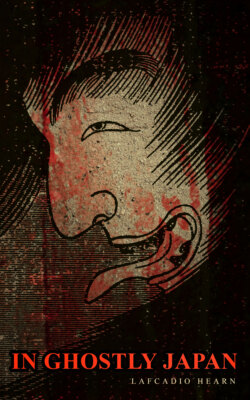Читать книгу In Ghostly Japan - Lafcadio Hearn - Страница 8
На сайте Литреса книга снята с продажи.
III
ОглавлениеThe common incense everywhere burned by poor people before Buddhist icons is called an-soku-ko. This is very cheap. Great quantities of it are burned by pilgrims in the bronze censers set before the entrances of famous temples; and in front of roadside images you may often see bundles of it. These are for the use of pious wayfarers, who pause before every Buddhist image on their path to repeat a brief prayer and, when possible, to set a few rods smouldering at the feet of the statue. But in rich temples, and during great religious ceremonies, much more expensive incense is used. Altogether three classes of perfumes are employed in Buddhist rites: ko, or incense-proper, in many varieties—(the word literally means only "fragrant substance"); —dzuko, an odorous ointment; and makko, a fragrant powder. Ko is burned; dzuko is rubbed upon the hands of the priest as an ointment of purification; and makko is sprinkled about the sanctuary. This makko is said to be identical with the sandalwood-powder so frequently mentioned in Buddhist texts. But it is only the true incense which can be said to bear an important relation to the religious service.
"Incense," declares the Soshi-Ryaku,1 "is the Messenger of Earnest Desire. When the rich Sudatta wished to invite the Buddha to a repast, he made use of incense. He was wont to ascend to the roof of his house on the eve of the day of the entertainment, and to remain standing there all night, holding a censer of precious incense. And as often as he did thus, the Buddha never failed to come on the following day at the exact time desired."
This text plainly implies that incense, as a burnt-offering, symbolizes the pious desires of the faithful. But it symbolizes other things also; and it has furnished many remarkable similes to Buddhist literature. Some of these, and not the least interesting, occur in prayers, of which the following, from the book called Hoji-san2 is a striking example:—
—"Let my body remain pure like a censer!—let my thought be ever as a fire of wisdom, purely consuming the incense of sila and of dhyana,3 that so may I do homage to all the Buddhas in the Ten Directions of the Past, the Present, and the Future!"
Sometimes in Buddhist sermons the destruction of Karma by virtuous effort is likened to the burning of incense by a pure flame,—sometimes, again, the life of man is compared to the smoke of incense. In his "Hundred Writings "(Hyaku-tsu-kiri- kami), the Shinshu priest Myoden says, quoting from the Buddhist work Kujikkajo, or "Ninety Articles ":—
"In the burning of incense we see that so long as any incense remains, so long does the burning continue, and the smoke mount skyward. Now the breath of this body of ours,—this impermanent combination of Earth, Water, Air, and Fire,—is like that smoke. And the changing of the incense into cold ashes when the flame expires is an emblem of the changing of our bodies into ashes when our funeral pyres have burnt themselves out."
He also tells us about that Incense-Paradise of which every believer ought to be reminded by the perfume of earthly incense: —"In the Thirty- Second Vow for the Attainment of the Paradise of Wondrous Incense," he says, "it is written: 'That Paradise is formed of hundreds of thousands of different kinds of incense, and of substances incalculably precious;—the beauty of it incomparably exceeds anything in the heavens or in the sphere of man;—the fragrance of it perfumes all the worlds of the Ten Directions of Space; and all who perceive that odor practise Buddha-deeds.' In ancient times there were men of superior wisdom and virtue who, by reason of their vow, obtained perception of the odor; but we, who are born with inferior wisdom and virtue in these later days, cannot obtain such perception. Nevertheless it will be well for us, when we smell the incense kindled before the image of Amida, to imagine that its odor is the wonderful fragrance of Paradise, and to repeat the Nembutsu in gratitude for the mercy of the Buddha."
